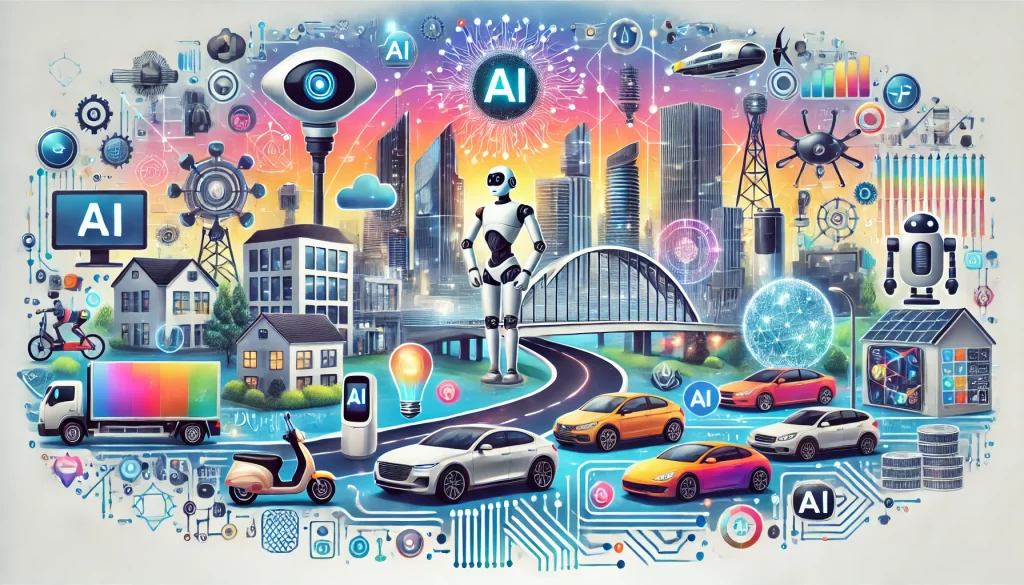Artificial Intelligence (AI) from an abstract technology has very quickly taken a shape which is now a force for change across sectors. From entrepreneurs to businesses are using AI to build new solutions, increase automation, and better serve customers. At the same time, if you’re thinking about starting an artificial intelligence-based business, this article lists more than 22 AI business ideas with great potential for growth in various spheres of life: healthcare, finance, education, and more. So, let us discuss main artificial intelligence business ideas.
1. AI-Powered Chatbots for Customer Support
Idea Overview:
Develop AI-powered chatbots that help businesses improve customer service by offering 24/7 assistance, answering FAQs, and resolving basic queries without human intervention.
Key Features:
- Natural Language Processing (NLP) for understanding and responding to queries.
- Integration with CRM systems.
- Multi-language support for global businesses.
Potential Markets:
E-commerce platforms, healthcare providers, and financial services can benefit immensely from AI chatbots. By automating repetitive tasks, businesses save costs and enhance customer experience.
Revenue Model:
- Subscription-based pricing.
- Custom chatbot development services.
2. AI-Driven Personalized Marketing Tools
Idea Overview:
Build tools that use AI to analyze consumer data and deliver personalized marketing campaigns. This includes product recommendations, email campaigns, and targeted ads.
Key Features:
- Behavioral analysis to predict customer preferences.
- Real-time data analytics for campaign optimization.
- Cross-channel marketing integration.
Potential Markets:
Retail, travel, and hospitality industries rely on personalized marketing to boost customer retention and sales.
Revenue Model:
- SaaS platform with tiered pricing.
- Consulting services for campaign optimization.
3. AI for Predictive Analytics in Finance
Idea Overview:
Develop AI solutions that provide predictive analytics for financial planning, fraud detection, and investment decision-making.
Key Features:
- Risk assessment algorithms.
- Stock market trend prediction.
- Fraud detection systems for online transactions.
Potential Markets:
Banks, insurance companies, and investment firms can benefit from these tools to minimize risk and maximize profits.
Revenue Model:
- Licensing predictive models to financial institutions.
- Profit-sharing agreements based on performance.
4. AI-Powered Virtual Health Assistants
Idea Overview:
Create AI-driven virtual assistants that can provide health advice, remind patients to take medications, and monitor symptoms for chronic conditions.
Key Features:
- Integration with wearable devices for real-time health data.
- Symptom analysis using AI models.
- Appointment scheduling and prescription reminders.
Potential Markets:
Telemedicine platforms, hospitals, and senior care facilities are key adopters of such technologies.
Revenue Model:
- Subscription models for healthcare providers.
- Licensing to telemedicine companies.
5. AI for Real Estate Recommendations
Idea Overview:
Develop platforms that use AI to analyze market trends, property values, and customer preferences to recommend ideal real estate options.
Key Features:
- Predictive analytics for property valuation.
- Virtual tours enhanced by AI recommendations.
- Mortgage and affordability calculators.
Potential Markets:
Real estate agencies, property management companies, and home buyers.
Revenue Model:
- Subscription-based access for real estate agents.
- Premium fees for personalized reports.
6. AI-Based Content Creation Tools
Idea Overview:
Create AI tools that generate articles, graphics, and videos for businesses looking to streamline their content marketing efforts.
Key Features:
- Automated text generation for blogs and ads.
- AI-based video editing and graphic design.
- Language translation capabilities.
Potential Markets:
Digital marketing agencies, small businesses, and content creators.
Revenue Model:
- Subscription plans for tool usage.
- Pay-per-use model for specific projects.
7. AI-Powered Recruitment Platforms
Idea Overview:
Develop AI-driven platforms that simplify recruitment by screening resumes, matching candidates with job roles, and conducting initial interviews.
Key Features:
- Resume parsing and ranking.
- Predictive analysis for candidate success.
- Video interview analysis using AI.
Potential Markets:
Recruitment agencies and large corporations.
Revenue Model:
- Per-recruit fee.
- Subscription-based pricing for companies.
8. AI for Supply Chain Optimization
Idea Overview:
Offer AI solutions that optimize supply chains by predicting demand, managing inventory, and identifying cost-saving opportunities.
Key Features:
- Real-time data analysis for inventory management.
- Route optimization for logistics.
- Predictive demand forecasting.
Potential Markets:
Manufacturing, retail, and logistics industries.
Revenue Model:
- SaaS subscription models.
- Custom implementation services.
9. AI in Agriculture
Idea Overview:
Create AI-powered solutions for precision farming, crop monitoring, and pest control to help farmers increase productivity and reduce costs.
Key Features:
- Drone-based imaging for crop health monitoring.
- AI algorithms for pest detection.
- Predictive weather analysis for farming decisions.
Potential Markets:
Agriculture technology companies, large-scale farms, and agricultural cooperatives.
Revenue Model:
- Hardware and software sales.
- Subscription-based services for analytics.
10. AI-Powered Cybersecurity Solutions
Idea Overview:
Develop AI tools that detect and prevent cyber threats, such as phishing attacks, malware, and data breaches.
Key Features:
- Real-time threat detection and response.
- User behavior analysis for anomaly detection.
- Automated vulnerability assessments.
Potential Markets:
Financial institutions, e-commerce platforms, and any business handling sensitive customer data.
Revenue Model:
- Licensing fees for AI tools.
- Managed cybersecurity services.
11. AI-Driven Virtual Interior Design
Idea Overview:
Create platforms that use AI to help customers visualize and design their spaces by generating realistic interior layouts.
Key Features:
- AI-powered room layout suggestions.
- Virtual reality integration for walkthroughs.
- Furniture and decor recommendations.
Potential Markets:
Interior designers, furniture retailers, and home improvement stores.
Revenue Model:
- One-time design fee.
- SaaS platform subscriptions for designers.
12. AI-Enhanced Online Learning Platforms
Idea Overview:
Develop AI-powered platforms that personalize learning experiences based on a student’s strengths, weaknesses, and pace of learning.
Key Features:
- Adaptive learning algorithms.
- Real-time performance tracking.
- Gamification to boost engagement.
Potential Markets:
Educational institutions, corporate training providers, and self-learners.
Revenue Model:
- Subscription fees for students.
- Licensing platforms to schools and businesses.
13. AI in Personalized Fitness Coaching
Idea Overview:
Offer AI-driven fitness apps that create personalized workout plans, track progress, and provide virtual coaching.
Key Features:
- AI-generated fitness routines.
- Integration with wearable devices.
- Nutritional guidance based on user data.
Potential Markets:
Fitness enthusiasts, gyms, and personal trainers.
Revenue Model:
- Subscription-based app services.
- One-time payment for premium features.
14. AI-Powered Voice Assistants for Businesses
Idea Overview:
Develop AI voice assistants tailored for business tasks like scheduling, project management, and customer service.
Key Features:
- Voice recognition and command execution.
- Integration with business tools like calendars and CRMs.
- Multi-language support.
Potential Markets:
Small and medium-sized businesses, corporate offices, and remote teams.
Revenue Model:
- Subscription pricing.
- One-time installation fees for enterprises.
15. AI for Environmental Sustainability
Idea Overview:
Create AI solutions that monitor and manage environmental resources, optimize energy consumption, and predict natural disasters.
Key Features:
- AI models for energy efficiency.
- Predictive analytics for disaster management.
- Waste management optimization.
Potential Markets:
Renewable energy companies, environmental agencies, and smart cities.
Revenue Model:
- Licensing AI tools to governments and enterprises.
- Consulting services for implementation.
16. AI for Legal Document Review
Idea Overview:
Develop AI-powered tools that assist lawyers and legal teams by reviewing and analyzing legal documents to save time and reduce errors.
Key Features:
- Automated document parsing and keyword identification.
- Risk analysis and flagging inconsistencies.
- Real-time collaboration features for teams.
Potential Markets:
Law firms, corporate legal departments, and individual lawyers.
Revenue Model:
- Subscription pricing based on the number of documents.
- Per-document review fees for one-time users.
17. AI for Smart City Management
Idea Overview:
Create AI platforms to manage smart city infrastructures such as traffic flow, waste collection, and energy distribution.
Key Features:
- Predictive models for traffic management.
- Smart waste collection routing.
- Energy consumption analytics for smart grids.
Potential Markets:
Municipal governments, urban planners, and private city developers.
Revenue Model:
- Long-term service contracts.
- Custom implementation fees.
18. AI-Powered Creative Design Platforms
Idea Overview:
Develop tools that use AI to assist creative professionals in designing logos, branding materials, and multimedia content.
Key Features:
- AI templates for quick design.
- Adaptive tools for personalized creativity.
- Real-time editing suggestions.
Potential Markets:
Marketing agencies, freelance designers, and startups.
Revenue Model:
- Subscription plans.
- Per-design fees for occasional users.
19. AI for Mental Health Support
Idea Overview:
Develop AI-powered mental health platforms that offer guided meditation, cognitive behavioral therapy (CBT) exercises, and emotional support through virtual assistants.
Key Features:
- AI-driven mood tracking.
- Personalized meditation and stress management plans.
- Anonymous and accessible 24/7 virtual therapists.
Potential Markets:
Individuals seeking mental health resources, therapists looking for digital tools, and corporate wellness programs.
Revenue Model:
- Subscription for individuals.
- Licensing to therapy practices or workplaces.
20. AI for Virtual Event Management
Idea Overview:
Create platforms that leverage AI to manage virtual events by providing audience engagement analytics, automated scheduling, and live transcription.
Key Features:
- Real-time audience sentiment analysis.
- Automated attendee matchmaking.
- AI-powered event scheduling tools.
Potential Markets:
Event planners, corporate clients, and education institutions hosting webinars and conferences.
Revenue Model:
- Pay-per-event pricing.
- Subscription model for frequent users.
21. AI for Language Learning
Idea Overview:
Build AI platforms that accelerate language learning through personalized lesson plans, speech recognition, and real-time feedback.
Key Features:
- Gamified learning for improved engagement.
- AI speech tutors for pronunciation practice.
- Customized pacing based on learner progress.
Potential Markets:
Language learners, schools, and multinational organizations.
Revenue Model:
- Monthly subscriptions.
- Tiered pricing for premium courses or certifications.
22. AI for E-commerce Visual Search
Idea Overview:
Develop visual search engines powered by AI that allow users to upload images to find similar products online.
Key Features:
- AI-powered image recognition.
- Product tagging and classification.
- Integration with major e-commerce platforms.
Potential Markets:
Fashion retailers, home decor brands, and online marketplaces.
Revenue Model:
- SaaS subscription for retailers.
- Commission-based earnings per transaction.
FAQs: Artificial Intelligence Business Ideas
1. How much does it cost to start an AI business?
The cost varies depending on the complexity of your AI product. Initial investments might range from $10,000 for a basic AI solution to $500,000+ for advanced platforms requiring custom models, infrastructure, and extensive data processing.
2. Do I need technical expertise to start an AI business?
While technical expertise is beneficial, it’s not mandatory. You can partner with AI developers, hire freelancers, or outsource your AI development to specialized firms.
3. What industries benefit the most from AI solutions?
AI benefits numerous industries, including healthcare, finance, education, agriculture, retail, and logistics. Choosing an industry depends on your background and market demand.
4. How do I find data for training AI models?
You can source data from publicly available datasets, scrape relevant information (while respecting copyright laws), or purchase datasets from trusted providers. Additionally, collaborating with companies that generate large amounts of data can be an option.
5. How do AI businesses generate revenue?
AI businesses typically generate revenue through subscription models, one-time service fees, licensing, or performance-based contracts. The model you choose depends on your target audience and product type.
6. What are the challenges of starting an AI business?
Challenges include securing funding, acquiring quality datasets, staying compliant with data privacy laws, ensuring model accuracy, and keeping up with the fast-paced evolution of AI technologies.
7. Can AI replace human jobs?
AI can automate repetitive and data-driven tasks, potentially replacing some jobs. However, it also creates new opportunities in AI development, management, and application, complementing human efforts rather than fully replacing them.
8. How do I stay competitive in the AI space?
Staying competitive requires continuous innovation, adapting to customer needs, ensuring ethical AI practices, and maintaining strong collaborations with industry leaders or universities.
9. What programming languages are commonly used in AI development?
Python is the most popular language for AI, thanks to its libraries like TensorFlow, PyTorch, and scikit-learn. Other languages include R, Java, and C++.
10. How long does it take to develop an AI solution?
Development timelines depend on the complexity of the solution. A basic chatbot could take weeks, while sophisticated predictive analytics tools might require months or even a year.
Conclusion: Artificial Intelligence Business Ideas
Artificial intelligence is a transformative set of technologies that, when masterminded, enables businesses to innovate at scale and succeed in every aspect of the digital economy. AI has countless applications ranging across various sectors from healthcare to education. As the future of work evolves, entrepreneurs who can pinpoint needs and engineer solutions will not only be the ones who make a success of their businesses, but also the ones who help transform industries through technology.
So whether you’re an established entrepreneur or a wannabe innovator, the time to lean in to AI is right now. You can take advantage of this technological revolution by establishing yourself early on with one or several of the above-listed business ideas. The future is artificial intelligence – and it’s ready for you to leave your mark.


